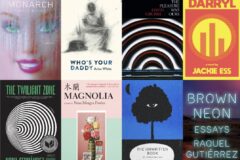Release Date: March 17, 2015
Label: True Panther
He’s been hailed as the latest link in the venerable Los Angeles-singer-songwriter chain. But L.A. chewed Tobias Jesso Jr. up. He and his band, the Sessions, moved there from Vancouver in 2008 to back a pop singer named Melissa Cavatti. She quit the industry, but Jesso stuck around, writing songs for a couple of years until packing it in. A bassist by trade, after moving back home he began composing on an unfamiliar instrument, the piano, garnering attention with “Just a Dream.” Over the course of taking his solo debut album, Goon, from scattered demos to finished product, Jesso has accrued comparisons to everyone from Harry Nilsson to Emitt Rhodes to Randy Newman to Al Stewart.
One difference between Jesso and his predecessors, though, is that those dudes could play. The majority of cuts on Goon still feel like demos: languidly spaced chords, carefully measured arpeggiation, and hardly anything so gauche as a groove. The twinkle, such as it is, comes from the vocal. Jesso has a high, doleful tenor; it practically hunches over the keys. When he turns it loose, it’s like watching someone let go of the handlebars: On the Nilssonian sideshow romp “Crocodile Tears,” he actually works up some real fake weeping; on “How Could You Babe,” what begins as a you-go-your-way ballad turns out to be an exorcism, as Jesso repeatedly flogs himself with the titular question. Generally, though, the tension between his fully-formed toplines and his placid playing is something to enliven the record’s backstory. But it may not be enough for a follow-up album. (Unless he switches instruments — replace Goon‘s keys with a six-string and you’d have a Waxahatchee record.)
Fortunately — despite insisting otherwise — he’s thinking past the piano. “The Wait” and album closer “Tell the Truth” are built on filigreed guitar figures. The former is the kind of bashfully melodic meet-cute Arthur Russell was so good at; the latter combines the guitar tone Jackson Browne used on Nico’s Chelsea Girl with an inventive, robust string ensemble. And while a song like “Hollywood” — Goon’s thematic and positional center — comes off like a less dissolute “Desperados Under the Eaves,” Jesso knows when to shelve the hangdog chords in favor of a droning brass section, wheezing like a sack of punctured lungs. It’s not alt-rock provincialism to prize these kinds of touches. After all, one of the great paradoxes of the singer-songwriter is how widely an idiosyncratic composition can resonate.





